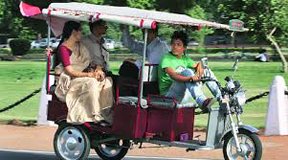 NEW DELHI: The Delhi High Court today agreed to hear a PIL seeking measures to regulate radio cabs in the national capital, which were allegedly flouting existing norms and guidelines made by the government, days after a 27-year- old woman was raped by an Uber taxi driver.
NEW DELHI: The Delhi High Court today agreed to hear a PIL seeking measures to regulate radio cabs in the national capital, which were allegedly flouting existing norms and guidelines made by the government, days after a 27-year- old woman was raped by an Uber taxi driver.
A bench of Chief Justice G Rohini and Justice Rajiv Sahai Endlaw said it will not dispose of the matter and will keep it pending after Additional Solicitor General Sanjay Jain, appearing for the Centre, submitted that steps have been taken in this regard.
“What steps you have taken with regard to the issue. How you are proceeding with the matter, inform us,” the court said, adding, “We will keep it (PIL) pending.”
The matter has now been fixed for further hearing on February 4, 2015.
The PIL filed by Damini Chawla, a lawyer in the Delhi High Court, has sought action against all radio taxi companies which were flouting regulations.
The plea claimed that even though the Delhi government had created a ‘Radio Taxi Scheme, 2006’, which lays down the terms and conditions for licensing of taxi services, including character verification of the driver, the scheme was not being followed.
“Car rental companies only provide for platform/interface for booking cabs. Surprisingly, such companies neither own any car nor do they have drivers on their payroll. The said acts are blatant violation of the Radio Taxi Scheme, 2006,” the PIL said.
Chawla also claimed that on November 13, she traveled in an Ola cab and its driver had informed her that he was an accused in a murder case. He sought her legal advice, saying he was driving the cab while out on bail.
“Such an incident speaks for itself about the safety ensured by the cab companies,” the plea said.
According to the PIL, the 2006 scheme “puts a further responsibility on the employer/licensee to ensure that the drivers are totally safe, reliable and trustworthy. The employer is further made jointly and severally responsible for any offence or crime which has been committed by a person, including driver, using the said vehicle.”
It sought banning and prosecution of “web/mobile- based cab providing companies which are not adhering to the mandatory provisions of the law regulating the business of renting motor cabs with immediate effect”.–PTI





